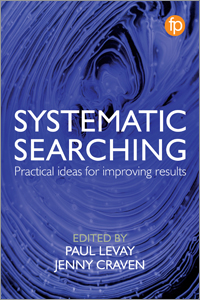
Primary tabs
You don't need to be an ALA Member to purchase from the ALA Store, but you'll be asked to create an online account/profile during checkout to proceed. This Web Account is for both Members and non-Members. Note that your ALA Member discount will be applied at the final step of the checkout process.
If you are Tax-Exempt, please verify that your account is currently set up as exempt before placing your order, as our new fulfillment center will need current documentation. Learn how to verify here.
- Description
- Table of Contents
- About the authors
- Reviews
The book brings together expert international practitioners and researchers to highlight the latest thinking on systematic searching. Beginning by looking at the role of the information specialist as an expert searcher, the book then examines the current challenges and the potential solutions to more effective searching in detail. Systematic Searching blends theory and practice and takes into account several different approaches to information retrieval and information-seeking behavior with special focus being given to searching for complex topics in a health-related environment. The book does not presume an in-depth prior knowledge or experience of systematic searching and includes case studies, practical examples and ideas for further research and reading to ensure the book is accessible to all.
The book is divided into three parts:
- Part 1: "Methods" covers theoretical models of information seeking and also systematic searching practice, including search filters and controlled vocabularies;
- Part 2: "Technology" covers new technologies for retrieving evidence such as social media and the Semantic Web, as well as using text mining to support the development of search strategies; and
- Part 3: "People" considers the future of the information specialist as an expert searcher and explores how information professionals could develop their skills and find new roles.
Figures, tables and case studies
Contributors
Acknowledgements
Abbreviations
Foreword – Carol Lefebvre
1. Introduction: where are we now? – Paul Levay and Jenny Craven
2. Innovative approaches to systematic reviewing – Andrew Booth
3. Searching for broad-based topics – Claire Stansfield
4. Choosing the right databases and search techniques – Alison Bethal and Morwenna Rogers
5. Gathering evidence from grey literature and unpublished data – Shannon Kugley and Richard Epstein
6. Social media as a source of evidence – Su Golder
7. Text mining for information specialists – Julie Glanville
8. Using linked data for evidence synthesis – Andy Mitchell and Chris Mavergames
9. Evidence surveillance to keep up to date with new research – James Thomas, Anna Noel-Storr and Steve McDonald
10. Training the next generation of information specialists – Michelle Maden and Gil Young
11. Collaborative working to improve searching – Siw Waffenschmidt and Elke Hausner
12. Communication for information specialists – Margaret Sampson
13. The information specialist as an expert searcher – Alison Brettle
14. Conclusion: where do we go from here? – Paul Levay and Jenny Craven
Glossary
Index
Paul Levay
Paul Levay is an Information Specialist at the National Institute for Health and Care Excellence (NICE). His research interests are in developing search methods to support Health Technology Assessments and public health guidelines. He has previously held posts at the National Police Library and the Greater London Authority. Paul is a chartered member of the Chartered Institute of Library and Information Professionals (CILIP).
Jenny Craven
Jenny Craven is an Information Specialist at the National Institute for Health and Care Excellence (NICE). Previously, Jenny worked at the Centre for Research in Library and Information Management (CERLIM) at Manchester Metropolitan University; she worked on practical information related projects, with a particular focus on improving access to information for people with visual impairments. During this time she was on the standing committee of the IFLA libraries serving persons with disabilities group, and ran a series of workshops in developing countries for the FORCE Foundation charity on providing accessible library services. Her role at NICE involves supporting the information needs for a variety of programmes across NICE. She also works on internal projects to improve service delivery, the evaluation of information skills training, and to explore methods for the effective retrieval of information. As editor, her books include Web Accessibility: Practical Advice for the Library and Information Professional (2008) and Access, Delivery, Performance: The Future of Libraries Without Walls (2009).
”The authors argue that systematic searching is an integral part of conducting reviews for both focused and broader-based topics. More data sources, search techniques, and technologies require a highly skilled, well-educated, and well-trained workforce. There is therefore an opportunity to showcase the skills of systematic searchers as experts ... Recommended."
— CHOICE


